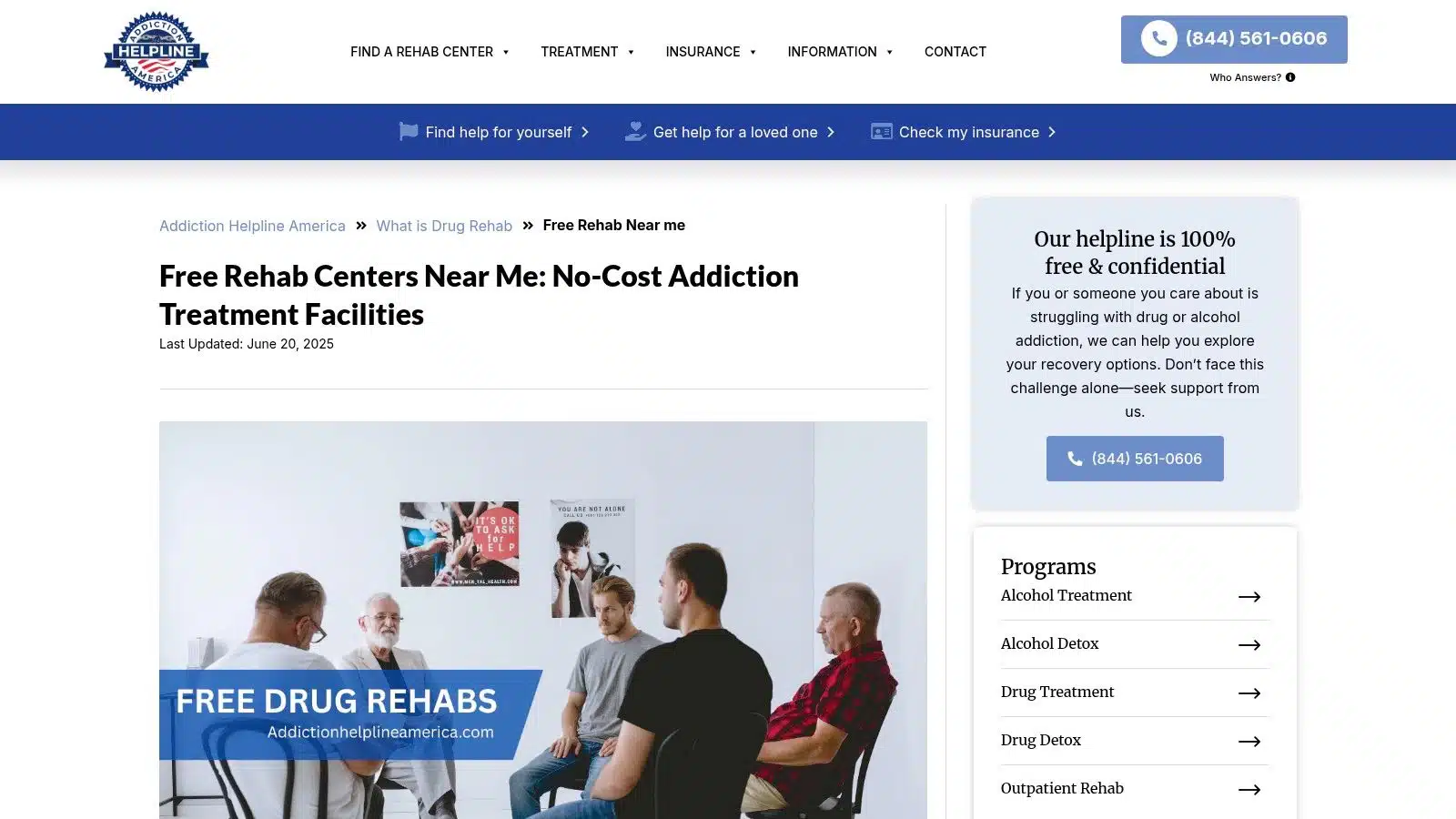
When you or someone you love is ready to overcome addiction, the cost of treatment should never be a barrier to getting help. The financial burden of professional care can feel overwhelming, but a path to recovery without the high price tag is absolutely possible. This guide is your comprehensive roadmap to finding and accessing free drug and alcohol helplines across the country. We’ve done the heavy lifting to provide a direct, no-nonsense resource that connects you with the help you need, right now.
This article cuts through the confusion by providing a detailed list of the 12 best online resources and directories for locating no-cost treatment. For each platform, we’ll explain exactly what it is, who it’s for, and how to use it effectively. You will find practical steps, eligibility insights, and an honest look at the services offered, from government-funded programs to nonprofit organizations. We include screenshots and direct links to get you started immediately.
Consider this your first, most crucial step toward a healthier future. We are arming you with the knowledge that help is available, accessible, and affordable. Let’s explore the tools that can connect you to life-saving services today.
1. Free Rehab Centers Near Me: No-Cost Addiction Treatment Facilities
As a premier resource for locating free drug and alcohol rehab centers, Addiction Helpline America’s “Free Rehab Centers Near Me” page stands out for its comprehensive directory and integrated, 24/7 support system. This platform is more than just a list; it is a full-service guide designed to connect individuals with no-cost, state-funded, and nonprofit treatment facilities across the USA. Its key advantage lies in combining a user-friendly database with immediate, confidential human support.
The platform excels by addressing the most significant barrier to recovery: cost. By curating a list of facilities that offer services without financial burden, it opens the door to treatment for those who might otherwise go without help. The 24/7 helpline is a critical feature, staffed by trained representatives who provide empathetic guidance and help users navigate the often-complex process of finding and enrolling in a suitable program. This immediate access to support is invaluable for individuals or families in crisis. Learn more about how to access free addiction treatment options and what to expect from the process.https://www.youtube.com/embed/S2ySA9unVIg
Strengths and Considerations
| Feature Analysis | Practical Application |
|---|---|
| Comprehensive Directory | Users can search for both state-funded and nonprofit rehabs, providing a wide range of no-cost inpatient and outpatient options. |
| 24/7 Confidential Helpline | Offers immediate, real-time crisis intervention and personalized guidance, which is crucial for those needing urgent help. |
| Educational Resources | The site provides clear explanations of addiction and the treatment process, demystifying recovery for first-time seekers. |
| Geographic Limitations | Potential Drawback: The availability and types of free centers can vary significantly depending on state funding and local demand, leading to potential waitlists. |
Practical Tip: When using the helpline, be prepared to discuss your specific situation, location, and substance use history. This information will allow the representative to quickly identify the most appropriate and available free rehab centers in your area.
Website: https://addictionhelplineamerica.com/drug-rehab/free-rehabs/
2. FindTreatment.gov (SAMHSA’s Behavioral Health Treatment Services Locator)
As the official directory from the U.S. government’s Substance Abuse and Mental Health Services Administration (SAMHSA), FindTreatment.gov is arguably the most authoritative starting point for anyone seeking free drug and alcohol rehab centers. Its primary strength lies in its comprehensive, nationwide database of state-licensed providers. The platform is completely free and anonymous, allowing you to search for help without compromising your privacy.
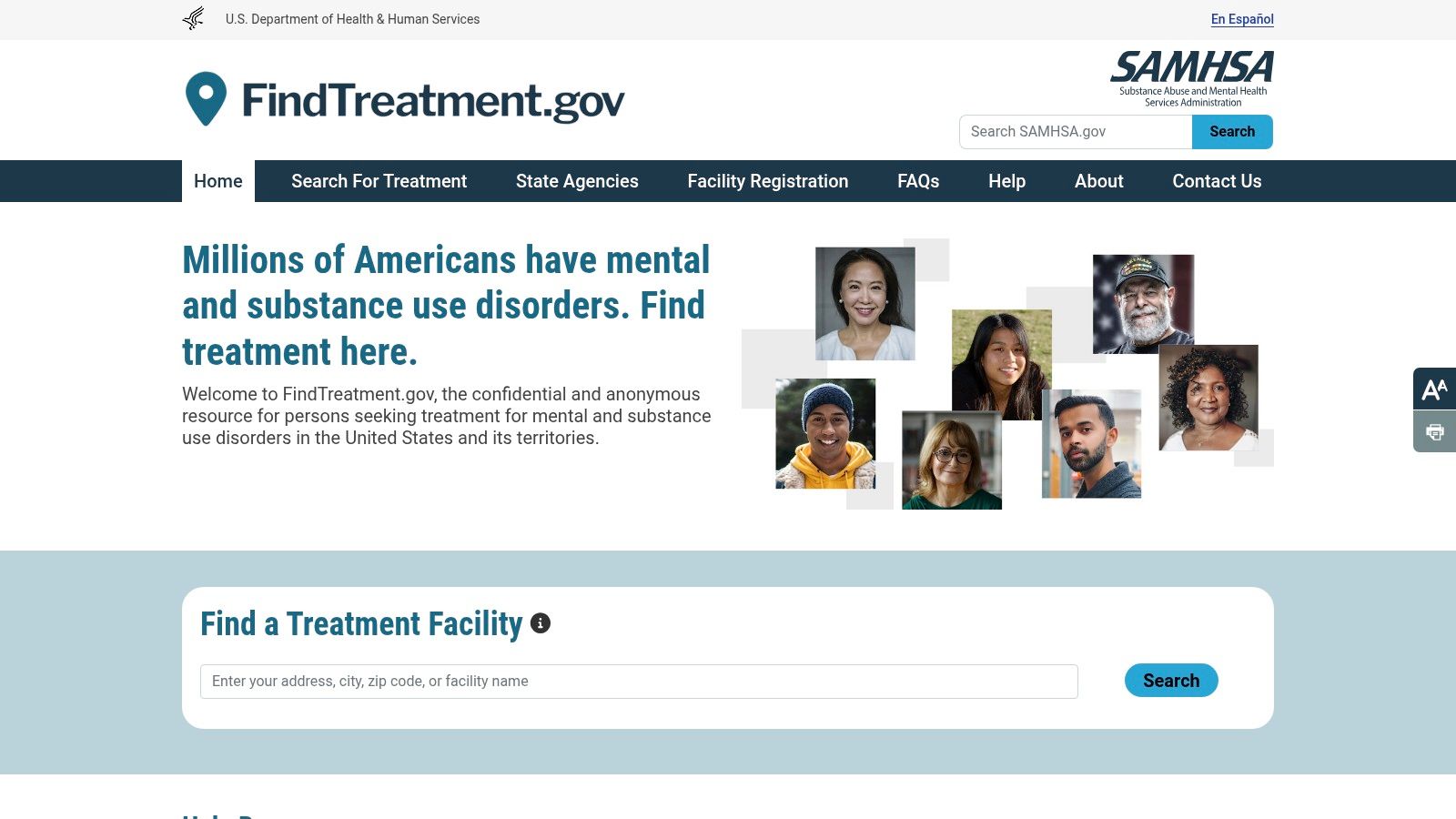
How to Use FindTreatment.gov Effectively
The platform’s powerful filtering system is its best feature. You can narrow your search by location, specific substances treated, and, most importantly, payment options. To find free or low-cost care, use the “Payment Assistance” filter and select options like “Sliding fee scale,” “Payment assistance,” or “Medicaid.” This instantly shows you which facilities are most likely to offer affordable services. Learn more about navigating SAMHSA’s treatment locator to maximize your search. While it doesn’t confirm real-time bed availability, it provides direct contact information, empowering you to call facilities and inquire immediately.
Key Features:
- Official Directory: Maintained by the U.S. government for accuracy.
- Robust Filtering: Search by payment type, level of care, and special programs.
- Complete Anonymity: No personal information is required to search.
- Bilingual Access: Available in both English and Spanish.
Website: https://findtreatment.gov
Call Now – Your Journey to Recovery Begins Today!

Take the first step towards a healthier life! Call now to connect with our compassionate team and start your recovery journey today. Your path to healing awaits!
Our recovery specialists are available 24/7 to provide support, and all calls are confidential and free. Reach out anytime – we’re here to help!
3. SAMHSA National Helpline (24/7 treatment referral)
For those who find navigating online databases overwhelming, SAMHSA’s National Helpline offers a direct, human-centric alternative for finding free drug and alcohol rehab centers. This free, confidential, 24/7 service provides personalized referrals to local treatment facilities, support groups, and community-based organizations. It’s an invaluable resource for individuals or families needing immediate guidance from a trained specialist over the phone.
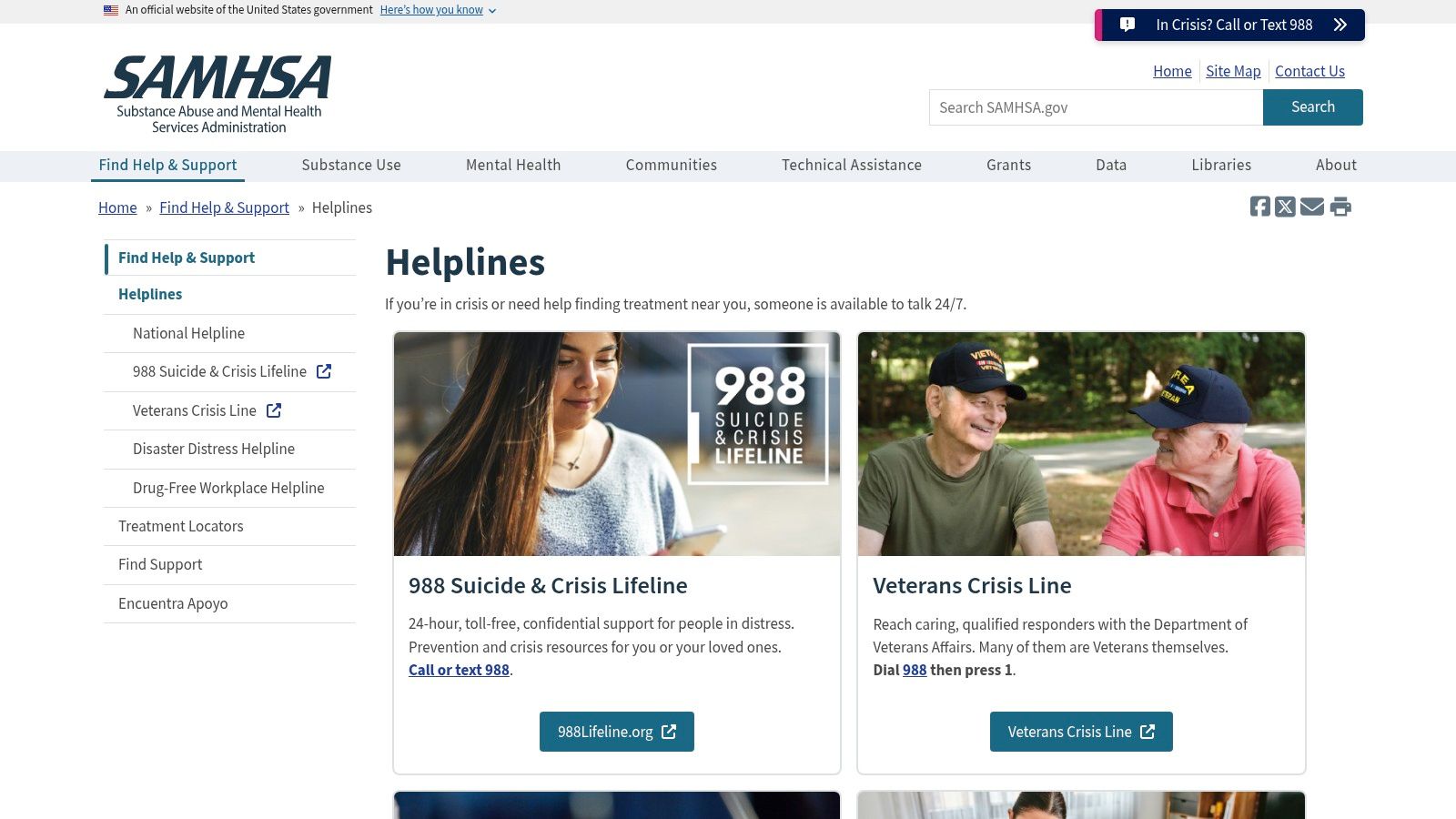
How to Use the SAMHSA National Helpline Effectively
The best way to use this service is to call 1-800-662-HELP (4357) prepared to discuss your specific needs, location, and financial situation. The specialist will use this information to search their extensive database and provide you with a curated list of relevant providers, including those with state funding or sliding-scale fees. This approach saves time and reduces the stress of self-directed searches. Learn more about the specific benefits of a substance abuse hotline and what to expect when you call. While the helpline doesn’t provide counseling, it excels at quickly connecting you to the right local resources for the next step.
Key Features:
- 24/7 Human Support: Speak directly with a trained information specialist anytime.
- Bilingual Services: Assistance is available in both English and Spanish.
- Personalized Referrals: Get a curated list of local treatment options.
- Multiple Contact Methods: Accessible via phone, text-to-locate, and TTY for the hearing impaired.
Website: https://www.samhsa.gov/find-help/helplines
4. TreatmentATLAS (by Shatterproof)
Developed by the national nonprofit Shatterproof, TreatmentATLAS is a quality-focused platform designed to help individuals find free drug and alcohol rehab centers based on evidence-based standards. Its unique approach is to provide a transparent look into a facility’s use of best practices, accreditation, and patient-reported experiences. The platform is free to use and partners with state governments to ensure data is both reliable and comprehensive within its service areas.
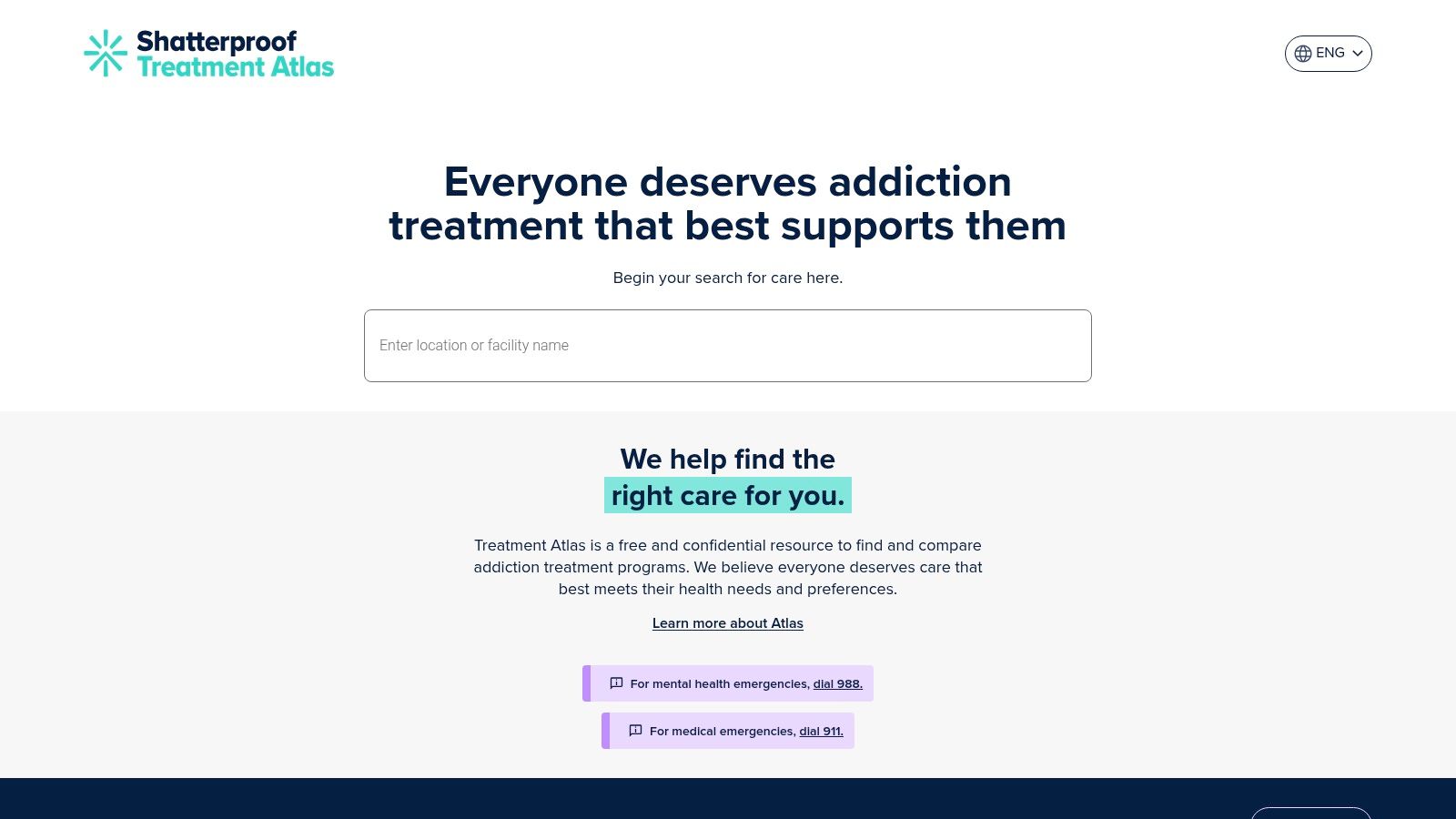
How to Use TreatmentATLAS Effectively
The standout feature of TreatmentATLAS is its emphasis on quality metrics. When searching, you can filter results not just by location but by specific services, accepted payment types (like Medicaid or no-cost options), and whether a facility follows nationally recognized best practices. Use the “Compare” tool to see up to three facilities side-by-side, evaluating their services and quality indicators to make a more informed choice. You can learn more about the different types of addiction therapy offered to better understand these quality metrics. While its biggest limitation is that it isn’t yet available nationwide, it is an invaluable tool in the states it serves.
Key Features:
- Quality Indicators: Compares facilities based on their use of evidence-based practices.
- Robust Filtering: Search by payment assistance, services, and specific populations served.
- Patient Reviews: Includes feedback from former patients in select states.
- State-Partnered: Works with state agencies to provide validated, up-to-date information.
Website: https://treatmentatlas.org
5. United Way 211
United Way 211 is a free, confidential navigation service that connects individuals to local health and human services, making it a powerful tool for finding free drug and alcohol rehab centers. Rather than a direct directory, 211 acts as a personalized guide. Trained specialists help you understand complex local funding, eligibility for state-sponsored programs, and how to access detox, treatment, and recovery housing. Its strength lies in its hyper-local focus and human-centered approach.
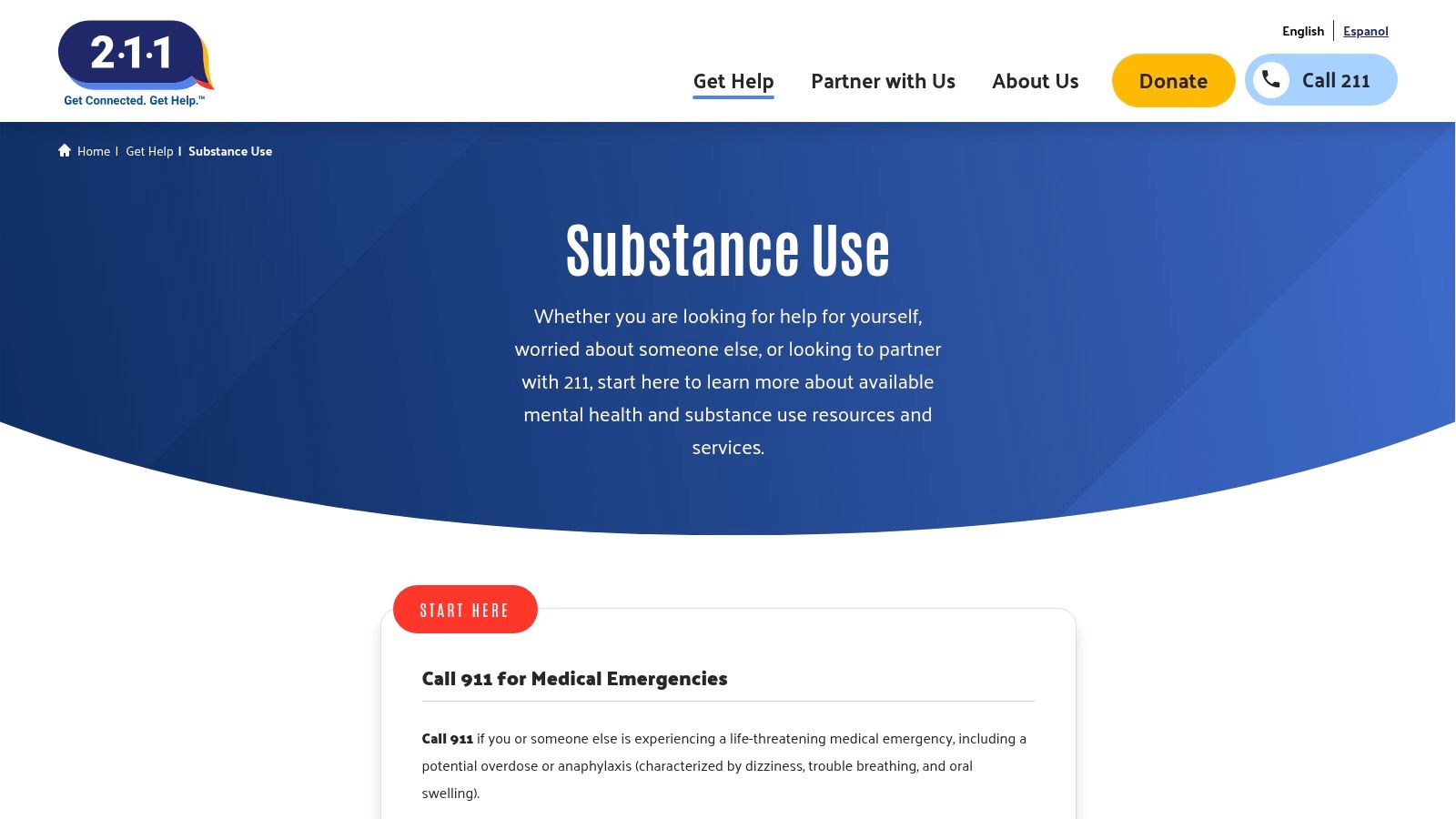
How to Use United Way 211 Effectively
The best way to use this service is by calling “211” directly from your phone. Speaking with a local specialist allows you to explain your specific situation, including financial hardship and lack of insurance. They can then identify not only potential treatment facilities but also essential wraparound services like transportation, childcare, or housing assistance that often create barriers to entering rehab. This holistic support is what sets 211 apart. It’s an excellent resource when you’re feeling overwhelmed and need a knowledgeable person to guide your next steps.
Key Features:
- Multiple Access Points: Reach specialists via phone (211), text, online chat, or web portal.
- Local Expertise: Staff are knowledgeable about county and state-specific funding and resources.
- Holistic Support: Connects users to wraparound services like housing, food, and employment aid.
- Completely Free: All navigation and referral services are provided at no cost.
Website: https://www.211.org/get-help/substance-use
Call Now – Your Journey to Recovery Begins Today!

Take the first step towards a healthier life! Call now to connect with our compassionate team and start your recovery journey today. Your path to healing awaits!
Our recovery specialists are available 24/7 to provide support, and all calls are confidential and free. Reach out anytime – we’re here to help!
6. HRSA “Find a Health Center” (Federally Qualified Health Centers)
The Health Resources and Services Administration (HRSA) offers a powerful tool for finding accessible, community-based care. While not exclusively for addiction treatment, the “Find a Health Center” locator connects you to Federally Qualified Health Centers (FQHCs), which are required to serve underserved populations. Many of these 1,400+ centers nationwide offer integrated substance use disorder services, making them a crucial resource for free drug and alcohol rehab centers, particularly for outpatient support.
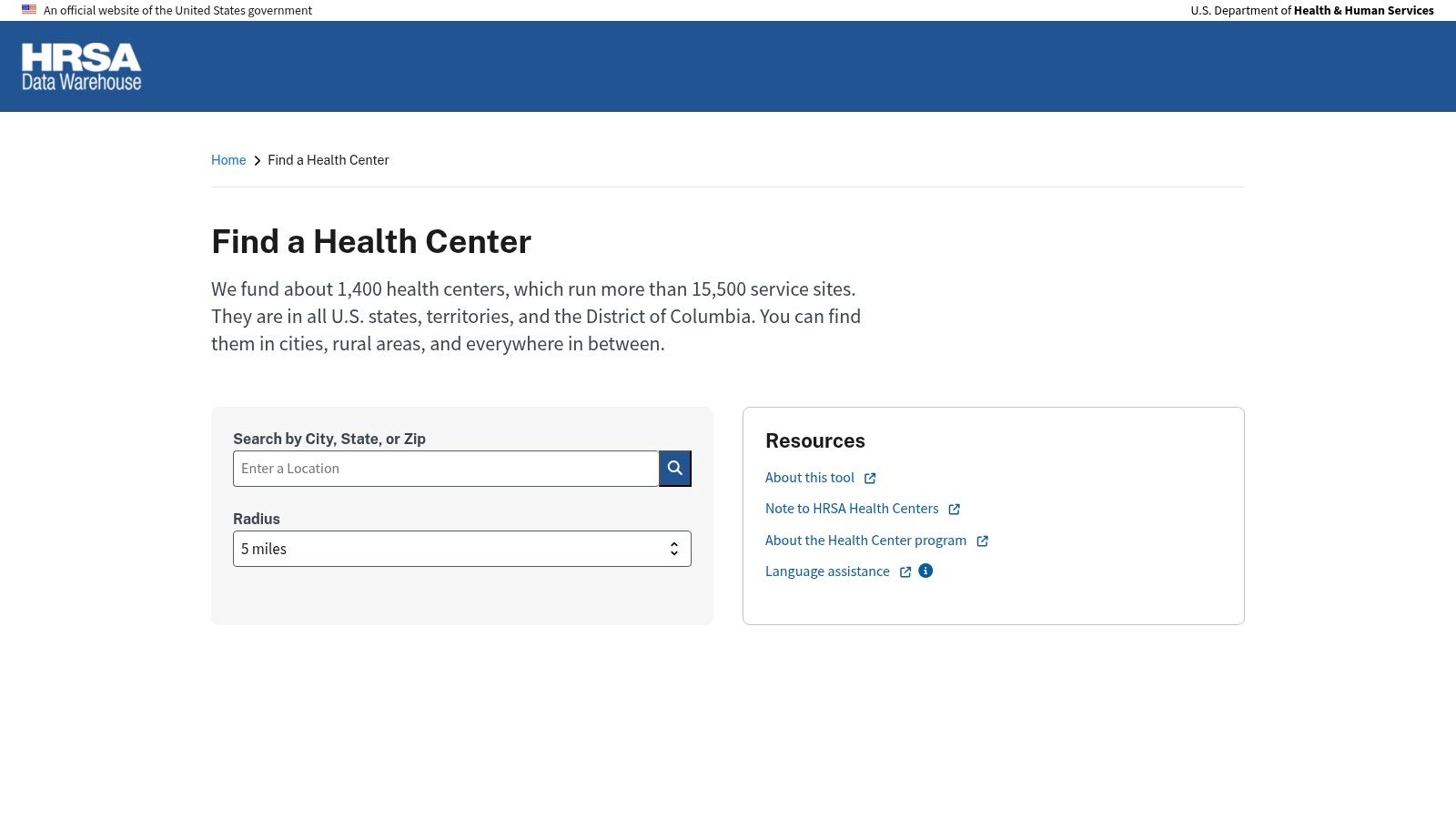
How to Use HRSA “Find a Health Center” Effectively
The HRSA locator is straightforward: enter your address, city, or zip code to see a map of nearby facilities. To find addiction-specific care, look for centers that list “Substance Use Services” in their profile. A key advantage of FQHCs is their commitment to affordability; they provide care on a sliding-fee scale based on your income and will not deny services due to an inability to pay. This makes them a reliable first stop for screening, counseling, and medication-assisted treatment (MAT) if you have limited or no insurance.
Key Features:
- Sliding-Fee Scale: Services are priced based on your income.
- Nationwide Coverage: Over 15,000 service sites across urban and rural areas.
- Accepts Medicaid: All FQHCs accept Medicaid and Medicare.
- Integrated Care: Many locations provide medical, mental health, and substance use services.
Website: https://findahealthcenter.hrsa.gov
7. U.S. Department of Veterans Affairs – SUD Program Locator
For U.S. military Veterans, the Department of Veterans Affairs (VA) offers one of the most direct pathways to free drug and alcohol rehab centers. The VA’s SUD Program Locator is a specialized directory designed to connect eligible Veterans with dedicated Substance Use Disorder (SUD) programs nationwide. This resource is invaluable because it integrates addiction treatment with the comprehensive healthcare and support services already available to Veterans, often at little to no out-of-pocket cost depending on their VA health care eligibility.
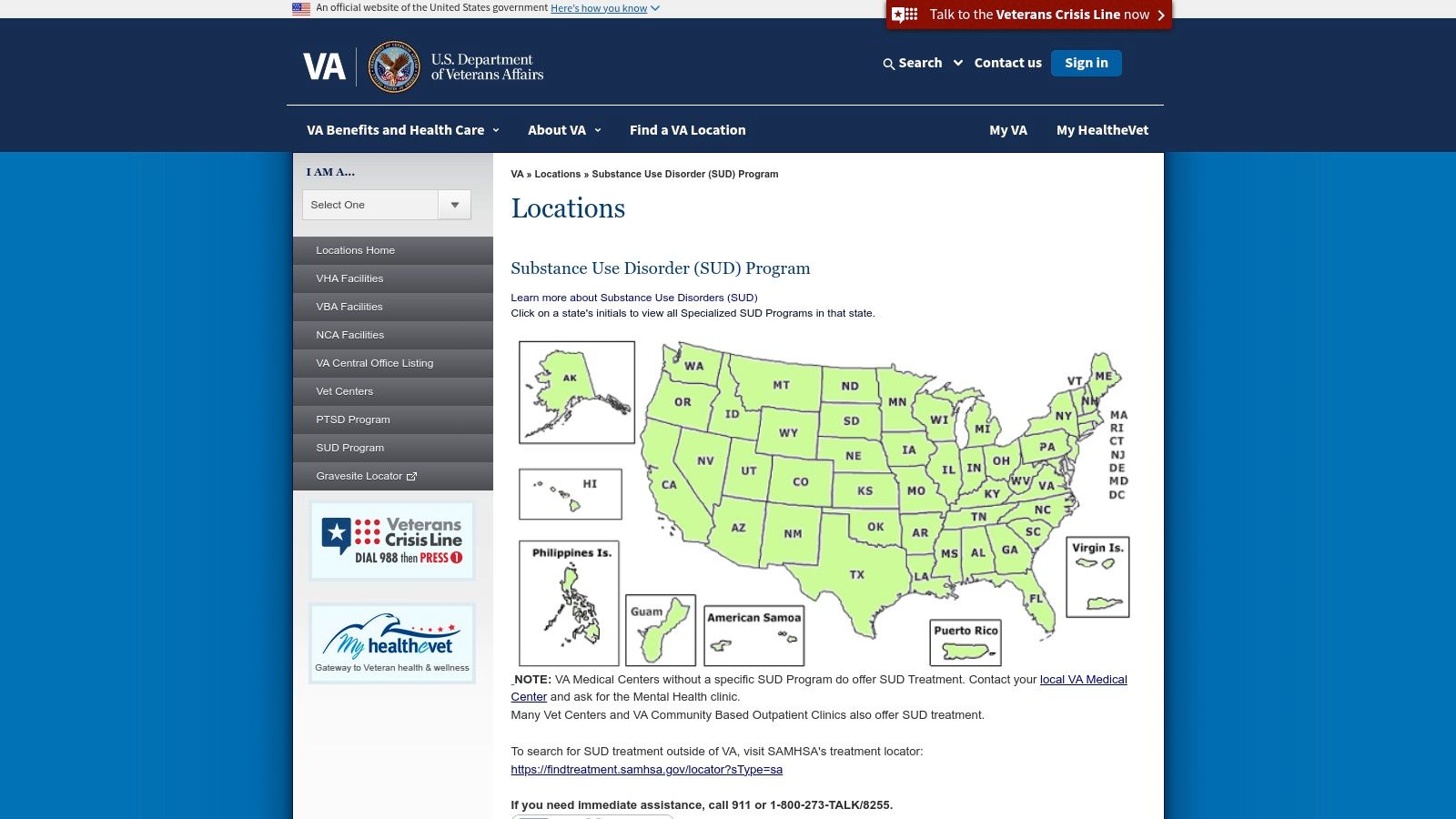
How to Use the VA SUD Program Locator Effectively
The locator is a straightforward, state-by-state guide. To use it, simply select your state from the dropdown menu to see a list of VA Medical Centers and outpatient clinics offering SUD services. Each listing provides direct contact information and a link to the facility’s website. The key advantage is that these programs are designed specifically for Veterans, addressing unique challenges like post-traumatic stress disorder (PTSD) alongside addiction. Veterans should call their local VA facility or speak with their primary care provider to get a referral and confirm their benefits.
Key Features:
- Veteran-Specific Care: Tailored programs that understand the unique experiences of military service members.
- Integrated Services: Treatment is coordinated with primary health, mental health, and housing services.
- Continuum of Care: Offers everything from detoxification and residential treatment to outpatient therapy and MAT.
- Eligibility-Based Cost: Services are often free for Veterans enrolled in VA health care.
Website: https://www.va.gov/directory/guide/SUD.asp
8. The Salvation Army – Adult Rehabilitation Centers (ARCs)
The Salvation Army offers a unique pathway to recovery through its Adult Rehabilitation Centers (ARCs), which provide genuinely free drug and alcohol rehab centers for those in need. These long-term, residential programs are funded entirely by sales from Salvation Army Thrift Stores. This model allows them to offer housing, meals, and recovery services at no cost to the individual, making it an incredibly accessible option for people without insurance or financial resources. The program’s foundation is a work-therapy model integrated within a supportive, faith-informed community.
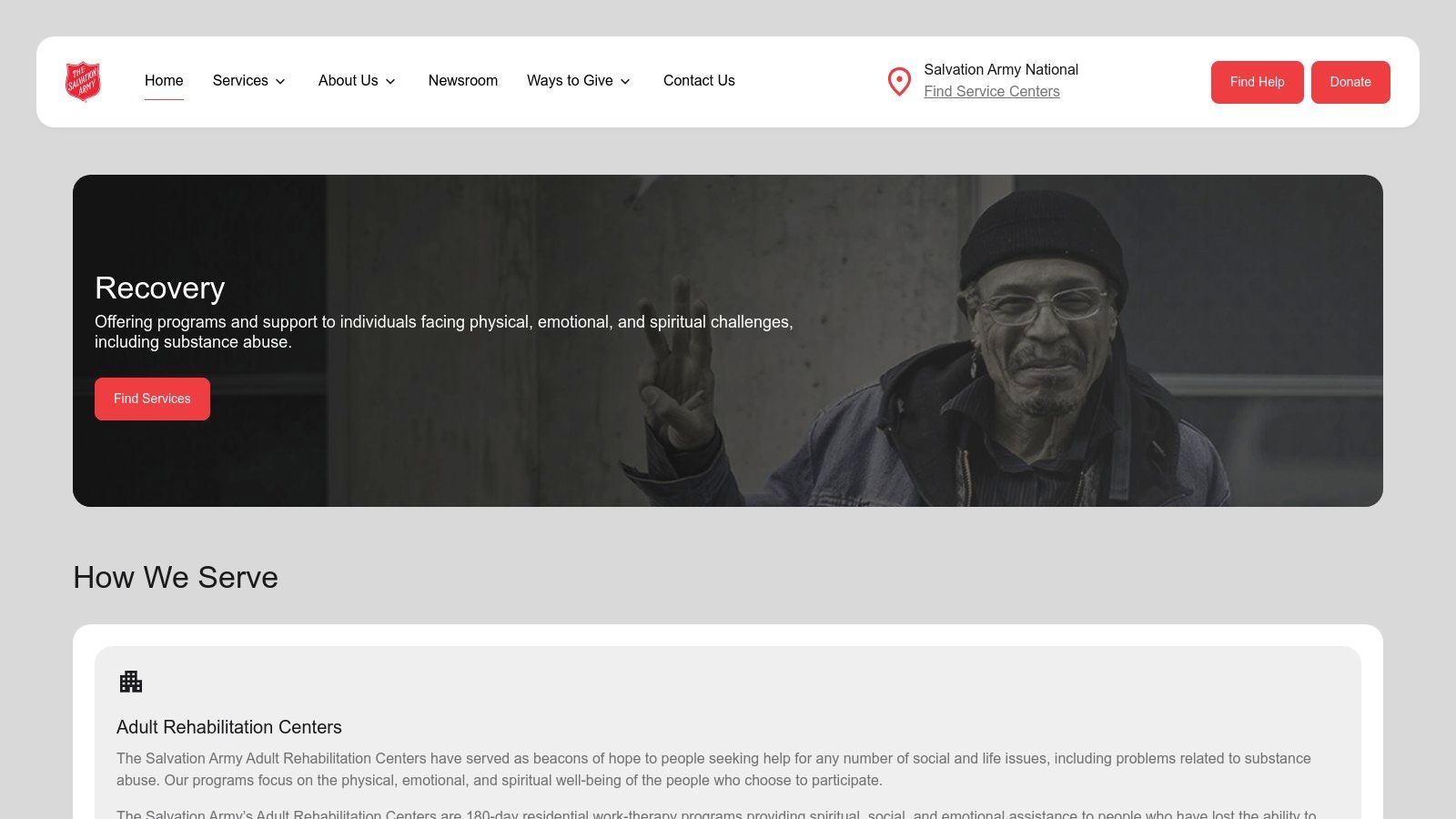
How to Use The Salvation Army ARC Program
The core of the ARC program is its 180-day residential work-therapy plan. Participants live at the center and work for the organization, often at donation centers or thrift stores, which helps instill structure, responsibility, and new skills. The program also includes individual and group counseling, spiritual guidance, and life-skills development. It’s crucial to understand that ARCs are not clinical or medical detox facilities. Prospective participants should contact their local Salvation Army ARC directly to inquire about eligibility and the intake process, as availability varies by location.
Key Features:
- No-Fee Program: Completely free, funded through charitable enterprise.
- Work-Therapy Model: Provides structure and builds work ethic.
- Long-Term Residential: Typically a six-month immersive program.
- Holistic Support: Includes housing, meals, and counseling services.
Website: https://www.salvationarmyusa.org/recovery/
9. FreeRehabCenters.org
FreeRehabCenters.org operates as a focused, privately-managed directory dedicated to helping users find free drug and alcohol rehab centers across the United States. Its primary value is its simple, location-based search function that often uncovers smaller, community-based, and faith-based nonprofit programs that may not be listed in larger government databases. The site aggregates information on facilities offering no-cost, low-cost, or sliding-scale payment options, making it a useful tool for those with limited financial resources.
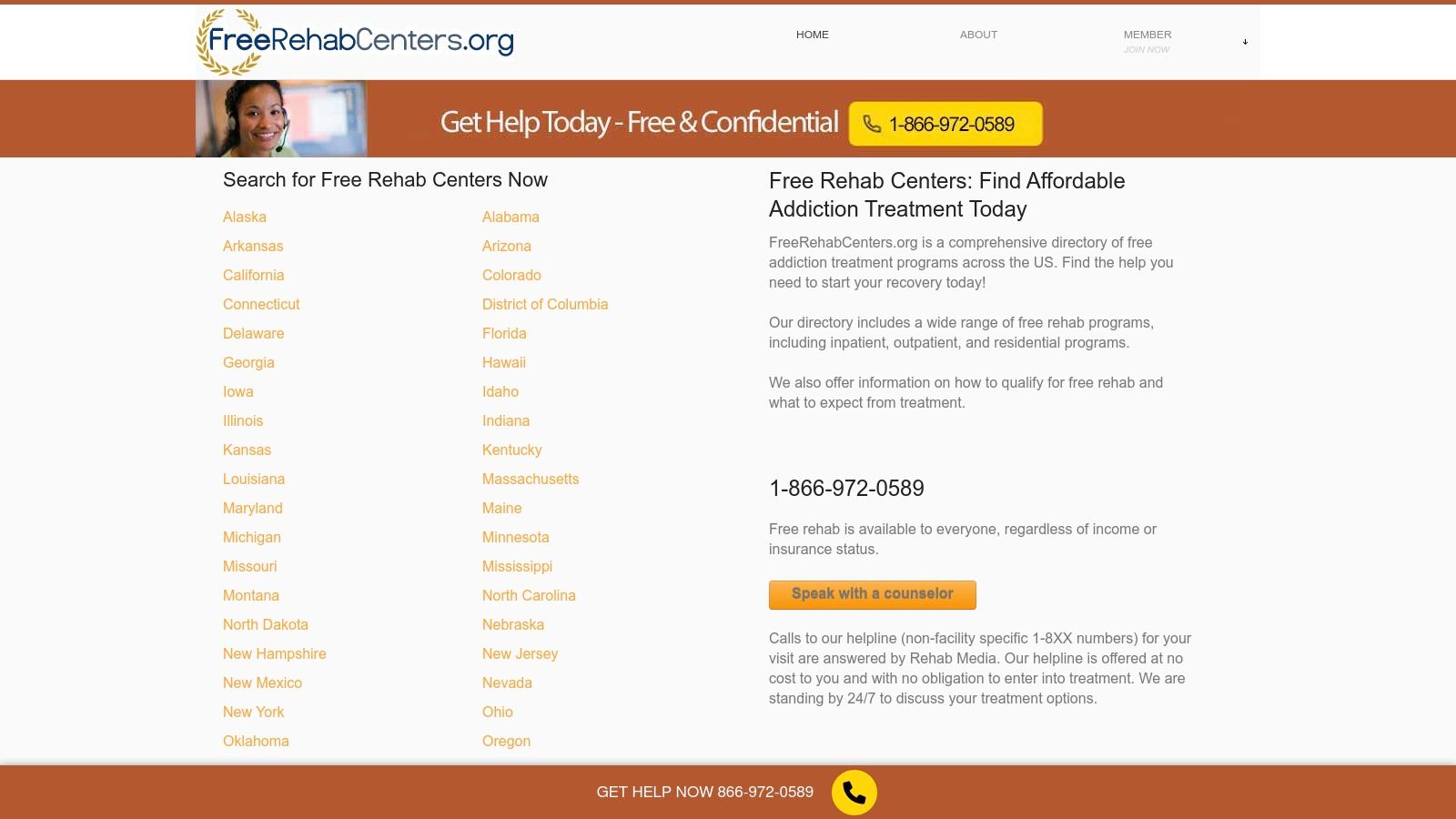
How to Use FreeRehabCenters.org Effectively
The most straightforward way to use the site is to navigate directly to your state and then browse by city. This approach presents a list of facilities with brief descriptions and, crucially, direct phone numbers. Because it is a third-party aggregator, it’s essential to treat this directory as a starting point for your research. Always call the listed centers directly to confirm the accuracy of their services, current availability, and specific eligibility requirements for free or reduced-cost care. This extra step is vital to ensure the information is up-to-date.
Key Features:
- State and City Navigation: Simple, drill-down search organized by location.
- Focus on Affordability: Listings are curated to highlight no-cost or sliding-scale programs.
- Direct Contact Information: Provides phone numbers to connect with facilities immediately.
- Uncovers Local Gems: Often includes smaller, community-level programs not found elsewhere.
Website: https://www.freerehabcenters.org/
10. Psychology Today – Treatment Centers Directory
While widely known for its therapist directory, Psychology Today also hosts an extensive Treatment Centers Directory that serves as a powerful tool for finding free drug and alcohol rehab centers. Its main advantage is the sheer volume of listings and the highly detailed filtering system, which goes beyond basic government directories. The interface is modern and user-friendly, allowing individuals to easily compare different facilities in one place.
How to Use Psychology Today Effectively
To find affordable care, navigate to the “Cost” filter and select “Sliding scale” and “Medicaid.” This immediately narrows the results to facilities that offer income-based pricing or accept public insurance. You can further refine your search by level of care (e.g., residential, outpatient), specific issues treated, and special populations served (e.g., veterans, LGBTQ+). Although facilities pay to be listed, which can create some bias, the platform provides direct contact information, so you must call to verify cost, availability, and eligibility for free services.
Key Features:
- Extensive Filtering: Refine searches by insurance, cost, level of care, and treatment modality.
- Detailed Profiles: View photos, amenities, and program philosophies for each center.
- Map View: Visually locate and compare centers in your desired area.
- User-Friendly Interface: Easily compare facilities side-by-side.
Website: https://www.psychologytoday.com/us/treatment-rehab
11. Directory of Single State Agencies (SSAs) for Substance Use Services (SAMHSA)
For those navigating state-specific funding and regulations, SAMHSA’s Directory of Single State Agencies (SSAs) is an indispensable resource. Rather than a searchable database, this is a direct contact list for the government bodies in each state responsible for administering public funds for substance use treatment. Contacting your state’s SSA is a strategic move to find free drug and alcohol rehab centers that receive state or federal block grant funding, which are often not listed in broader commercial directories.
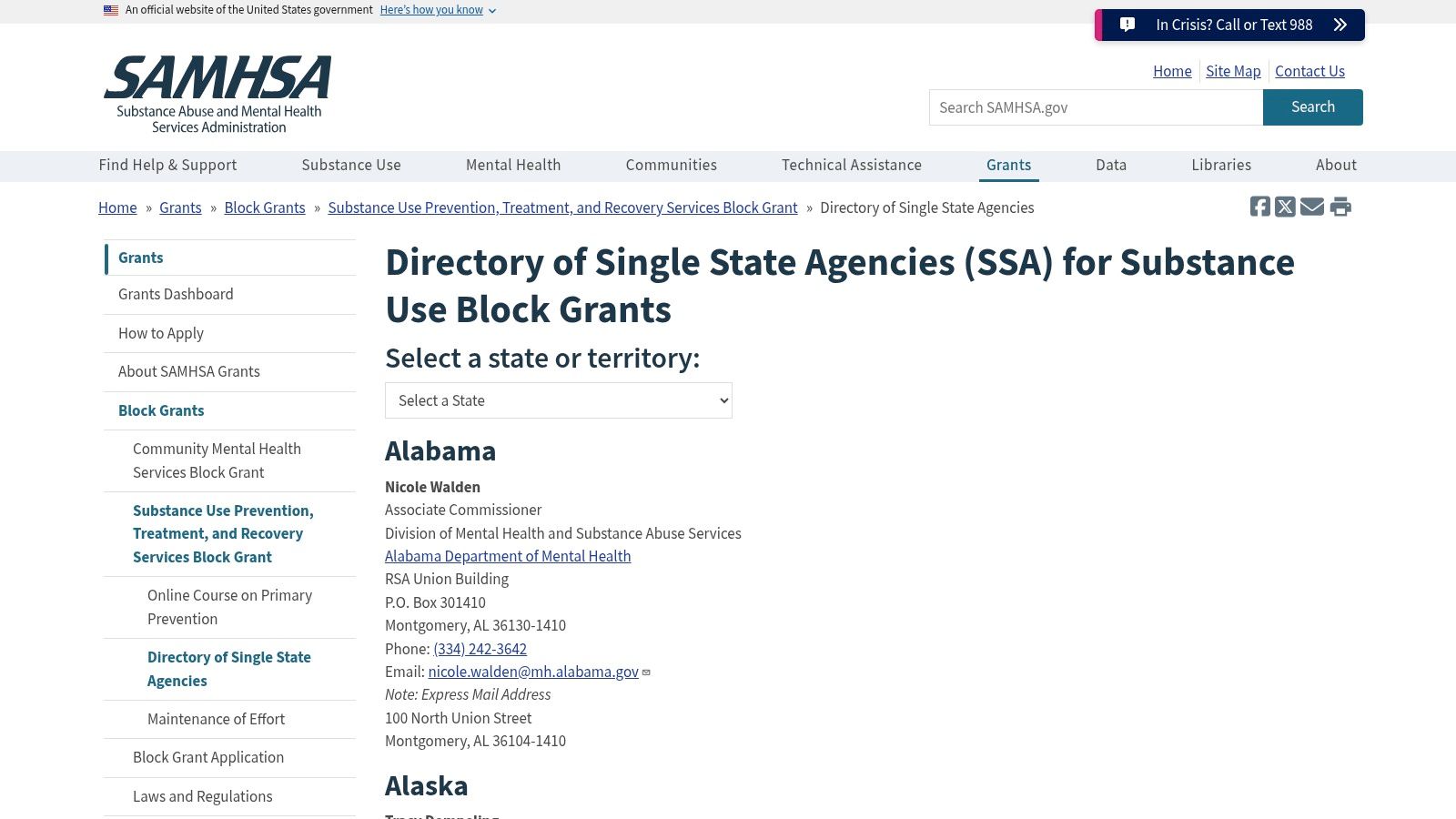
How to Use the SSA Directory Effectively
This resource is a PDF contact sheet, so it requires a more manual approach. Locate your state on the list and call or email the primary contact. When you reach out, explain your situation and ask about state-funded treatment programs, priority admission criteria for underserved populations, and how to access services with no income. This direct line can unlock information on waitlist management and eligibility for subsidized care that isn’t publicly advertised, giving you an inside track on available resources.
Key Features:
- Direct State Contacts: Provides phone numbers and emails for each state’s substance use authority.
- Access to Grant-Funded Programs: Uncovers facilities funded by state and federal grants.
- Authoritative Information: Official contacts ensure you receive accurate, state-specific guidance.
- State-Level Eligibility Rules: The best source for understanding local funding requirements.
Website: https://www.samhsa.gov/sites/default/files/ssadirectory-sa.pdf
12. StartYourRecovery.org
StartYourRecovery.org operates as a non-profit resource specifically designed for individuals and families facing substance use disorders for the first time. It pulls together treatment listings from SAMHSA and various state agencies, presenting them in a highly user-friendly format. Its primary goal is to demystify the treatment process, making it an excellent starting point for those looking for free drug and alcohol rehab centers but who feel overwhelmed by clinical jargon. The platform focuses on providing clear, objective information to help people understand their options.
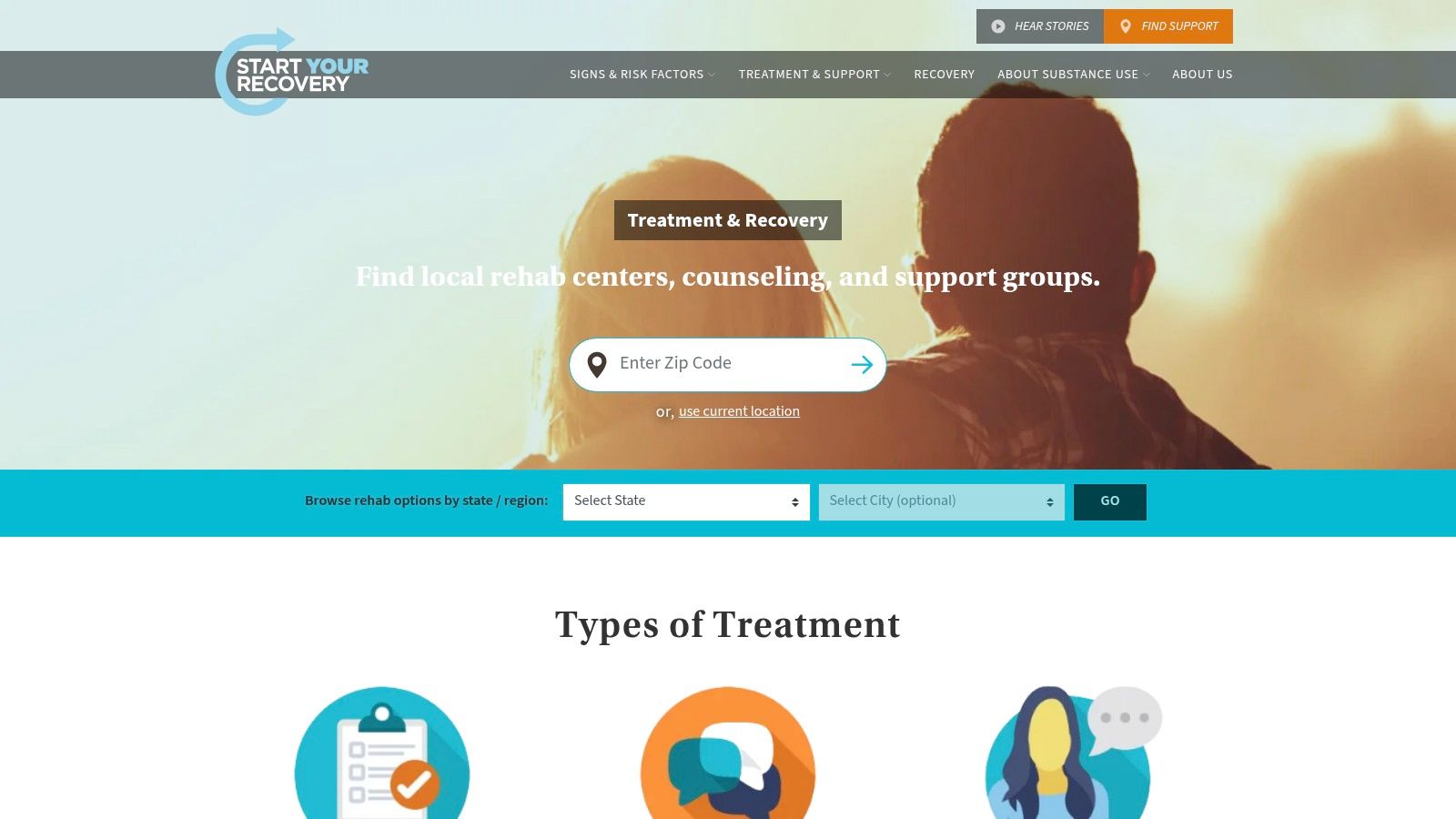
How to Use StartYourRecovery.org Effectively
The site’s strength lies in its curated profiles and straightforward search tools. To find affordable care, enter your location and then use the filters on the left-hand side for “Payment.” You can select “Medicaid,” “Private insurance,” or “State-financed,” which often correlate with low-cost or free services. The platform also includes helpful educational articles explaining different levels of care, which can help you determine whether you need detox, inpatient, or outpatient services. Because it is an aggregator, always call the facilities directly to confirm availability and specific payment assistance details.
Key Features:
- User-Friendly Interface: Designed for individuals new to the treatment landscape.
- Curated Profiles: Offers easy-to-understand descriptions of facilities.
- Helpful Filters: Search by payment type, accreditation (CARF, Joint Commission), and services.
- Educational Content: Provides articles and guides to help users understand addiction and recovery.
Website: https://startyourrecovery.org/treatment
Call Now – Your Journey to Recovery Begins Today!

Take the first step towards a healthier life! Call now to connect with our compassionate team and start your recovery journey today. Your path to healing awaits!
Our recovery specialists are available 24/7 to provide support, and all calls are confidential and free. Reach out anytime – we’re here to help!
Comparison of 12 Free Drug and Alcohol Helplines Resources
| Service/Resource | Core Features & Access | User Experience & Quality ★ | Value Proposition 💰 | Target Audience 👥 | Unique Selling Points ✨ | Price Points 💰 |
|---|---|---|---|---|---|---|
| Free Rehab Centers Near Me | Free, state-funded/nonprofit rehab directory + 24/7 helpline | Empathetic support, user-friendly guides ★★★★ | No-cost treatment, financial barrier reduction | Individuals & families seeking free treatment 👥 | 24/7 confidential helpline, educational resources ✨ | Free/no-cost 💰 |
| FindTreatment.gov (SAMHSA) | Nationwide licensed provider directory, payment filters | Comprehensive official directory ★★★★ | Extensive filters for no/low-cost options | General public, all US residents 👥 | Government-maintained, bilingual, map views ✨ | Free 💰 |
| SAMHSA National Helpline | 24/7 bilingual phone/text helpline, direct referrals | Quick personalized referrals ★★★★ | Fast, free treatment navigation | Individuals needing urgent help 👥 | Bilingual, TTY services, phone + text options ✨ | Free 💰 |
| TreatmentATLAS (by Shatterproof) | Quality metrics, patient reviews, payment filters | Focus on transparency & quality ★★★★ | Evidence-based program comparison | Users prioritizing quality in select states 👥 | Patient reviews, quality scorecards ✨ | Free 💰 |
| United Way 211 | Local social services navigator (phone, text, chat) | Strong local knowledge ★★★ | Wraparound service connections beyond treatment | Those needing broader social supports 👥 | Multi-channel access; housing and transport aid ✨ | Free 💰 |
| HRSA “Find a Health Center” | Nationwide community health centers w/ SUD services | Reliable outpatient care ★★★ | Sliding scale fees, Medicaid accepted | Low-income & uninsured, rural/urban 👥 | Broad coverage, sliding fee scale ✨ | Low/no cost sliding scale 💰 |
| U.S. Dept of Veterans Affairs – SUD Locator | VA-specific SUD programs, integrated care | Comprehensive VA services ★★★★ | No-cost care for eligible Veterans | Veterans only 👥 | Linked to VA benefits, housing ✨ | Often free for eligible vets 💰 |
| Salvation Army – Adult Rehabilitation Centers | No-fee, faith-based 180-day residential recovery | Structured long-term program ★★★ | No insurance needed, work-therapy model | Adults seeking faith-informed recovery 👥 | Long-term residential, no fee ✨ | Free 💰 |
| FreeRehabCenters.org | State/city no-cost & sliding fee program directory | Quick local leads, smaller nonprofits ★★ | Local no/low-cost options aggregation | Cost-sensitive local seekers 👥 | Includes county & nonprofit programs ✨ | Free 💰 |
| Psychology Today – Treatment Centers Directory | Filterable large directory w/ insurance & treatment types | Deep filtering, side-by-side comparisons ★★★ | Helps compare modalities and populations | Users seeking specific treatment types 👥 | Extensive insurance filters, map view ✨ | Variable, depends on provider 💰 |
| Directory of Single State Agencies (SAMHSA) | State substance authority contacts, funding access | State-specific eligibility expertise ★★ | Direct access to state-funded programs | Users navigating state-specific programs 👥 | State agency direct contacts ✨ | Free 💰 |
| StartYourRecovery.org | Curated profiles, payment & accreditation filters | Consumer-friendly guidance ★★★ | Beginner-friendly, educational tools | Treatment beginners & consumers 👥 | Accreditation filters, educational articles ✨ | Free 💰 |
Your Next Step on the Path to Recovery
Navigating the landscape of addiction treatment can feel overwhelming, but as this guide has shown, cost should not be the barrier that stops you from seeking help. The resources we’ve detailed, from comprehensive government locators to specialized non-profit directories, demonstrate that a wide array of free drug and alcohol rehab centers and low-cost options are available across the country. Recovery is not a privilege reserved for those who can afford expensive private facilities; it is a possibility for everyone.
The journey begins with a single, decisive action. The crucial takeaway is that while these tools provide the map, you must take the first step. Understanding the differences between the resources listed is key to finding the right path for your unique situation.
How to Choose and Take Action
To make the best choice, consider your immediate needs.
- For immediate, personalized guidance: If you’re unsure where to begin, the SAMHSA National Helpline or United Way 211 are excellent starting points. A confidential conversation with a trained specialist can provide clarity and direct you to local programs that fit your circumstances.
- For comprehensive, searchable databases: If you prefer to research options on your own, government-backed tools like FindTreatment.gov and HRSA’s “Find a Health Center” offer robust, filterable databases. These are ideal for locating specific types of care, such as medically-assisted detox or outpatient counseling in your zip code.
- For specialized populations: Veterans should prioritize the U.S. Department of Veterans Affairs SUD Program Locator, while those seeking a faith-based, long-term residential program might find The Salvation Army’s Adult Rehabilitation Centers to be a perfect fit.
Important Final Considerations
As you begin your outreach, remember a few practical points. Eligibility requirements are standard for most free programs, often based on income, residency, or lack of insurance. Be prepared to provide documentation and be honest about your situation.
Furthermore, waiting lists are a common reality for no-cost services due to high demand. This is not a reason to give up. We recommend contacting multiple facilities to increase your chances of finding an available spot sooner. Persistence is your greatest asset in this process. Your path to a healthier, substance-free life is real and attainable, and the help you need is often just one phone call or click away.
If you feel lost in the search or need immediate, confidential assistance navigating your options, our team is here to help. Addiction helpline America specializes in connecting individuals with treatment resources, including a network of free and low-cost rehab centers, ensuring you find the right support for your recovery journey.
Our helpline is 100%
free & confidential
If you or someone you care about is struggling with drug or alcohol addiction, we can help you explore your recovery options. Don’t face this challenge alone—seek support from us.
Programs
Resources
Will my insurance
cover addiction
treatment?
We're ready to help
Find the best
drug or alcohol treatment
center
Are you or a loved one struggling with addiction? Call today to speak to a treatment expert.















